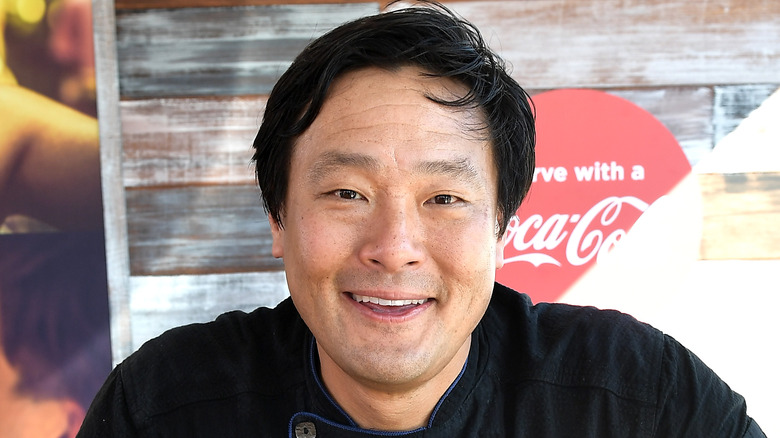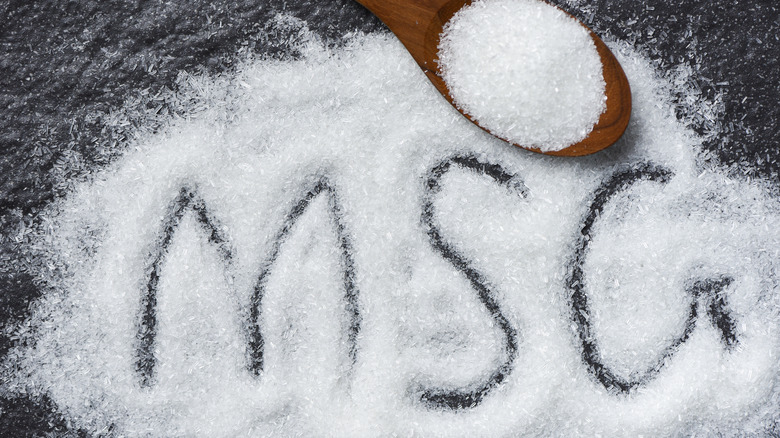The Biggest Misconception People Have About Chinese Food, According To Chef Ming Tsai - Exclusive
We may receive a commission on purchases made from links.
Lots of people believe popular food myths despite a lack of evidence, or even in some cases, evidence pointing to the contrary. Examples include the idea that gluten is bad for everyone, not just people with celiac disease (it's not, via Scripps). Then there's the belief that carrots improve your eyesight (they help, but so does any good vitamin A source, according to Scientific American).
While many food myths are generally harmless, there is one grave misconception that has long lingered in the culinary world that has done serious harm — and not to anyone's health, but to countless restaurants across America. That misconception is that MSG, or monosodium glutamate, is a dangerous food additive that leads to all sorts of ailments (via Today). Why was this notion so deleterious to so many establishments?
Because until the enduring falsehood emerged, much of the Chinese food cooked in America used MSG. During an exclusive interview with Mashed, chef, restaurateur, and cookbook author Ming Tsai explained that MSG is nothing to be feared and is even to be welcomed in cooking much of the time. "The biggest misconception [about Chinese food] is about MSG," Tsai said.
"MSG is no worse for you, it's actually maybe even better for you than salt," the chef added, "because you can use less of it, and sodium's not good for your body. If you can use less of it [than] sodium, that's actually better for your body. It's a glutamate. It naturally occurs in seaweed, it actually occurs in Parmesan cheese and soy sauce. It's not anything bad."
Where did the MSG rumors start?
Unlike most food myths, the misconceptions about MSG can be traced to the source, Ming Tsai told Mashed. "It's a crazy story," he says, and almost, "no one knows the truth. But there was an article that got published in a medical journal of science, a real published medical article. ...Quickly, some schools of thought said it was a joke, and it was a Caucasian man who made up an Asian name, and he just did that because he had a bet with a fellow doctor. He was an orthopedic, his friend said: 'You'll never get in the journal of science, you're just an orthopedic, you're a pathetic doctor,' and they made a bet, he got it in, that was the joke — and [because of] that joke? The repercussions are unbelievable." That damaging article was published in "The New England Journal of Medicine" by a "Robert Ho Man Kwok, MD" — a man later identified as Dr. Howard Steel, who admitted to fabricating the science (via Colgate Magazine).
"Fifty years ago," Tsai went on, "hundreds of articles came out about you get numbness of the neck and the limbs if you eat Chinese food because of MSG. It's all debunked ... But because of that one article, a lot of people are [still] like: 'Nope, I can't do Chinese food. Too much MSG, I don't want to eat chemicals.' That didn't help the industry at all."
But now, finally, things are changing again as more and more people realize that not only is monosodium glutamate not any worse for you than regular old salt, but in fact it's outright delicious. "I think now, David Chang's running the forefront," Tsai said. "He has MSG shakers on the tables [of his restaurants]!"
To taste one of Ming Tsai's recipes, check out his cookbook "Simply Ming In Your Kitchen". Follow along with the chef's projects on Ming.com.

